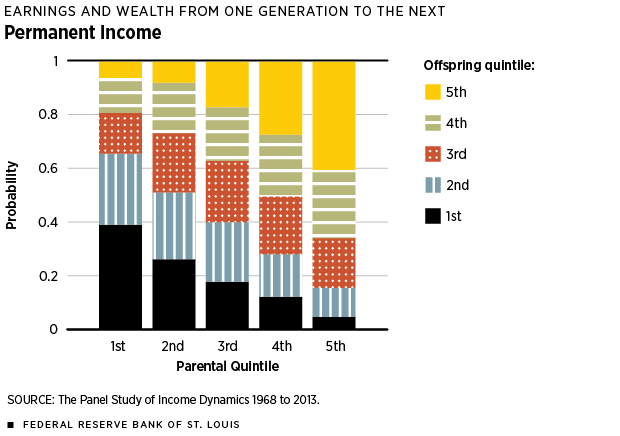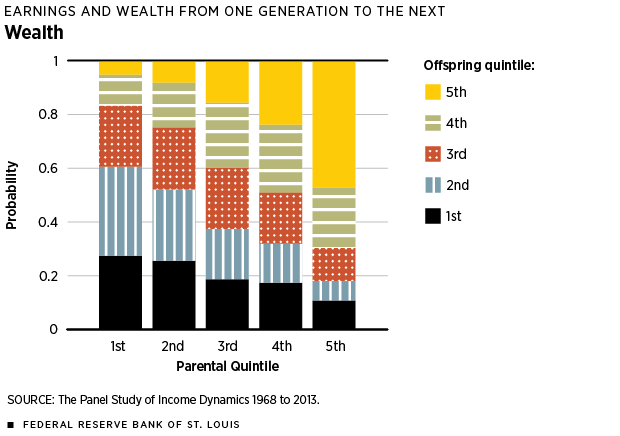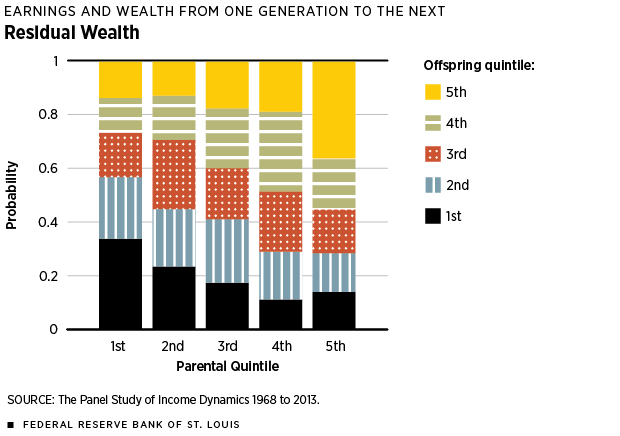Which Persists More from Generation to Generation—Income or Wealth?
Do you earn more money than your parents? Do you have more wealth, i.e., assets minus liabilities, than your parents? Economists use the answers to these questions to determine what is called intergenerational mobility—the changes in a family’s economic status between successive generations. Why should we care about intergenerational mobility? Being able to do better than one’s parents is part of the American Dream. Also, a society with intergenerational mobility might have less economic inequality across generations.
It is well-documented that income and wealth inequality, i.e., the size of the differences in income or wealth between the haves and the have-nots, has increased significantly over the past 40 years.1 If there were no inequality, then economic mobility would probably not be a topic of discussion because parents would have no economic advantage to bequeath. However, inequality exists, and as it increases, the need for economic mobility becomes more important. Policies that promote economic mobility can reduce inequality in the next generation.
What is it that makes one society more economically mobile than another? Are there factors that can promote economic mobility? In discussing such questions, economists have come up with two possible approaches to these challenges: (1) the economic opportunity structure and (2) economic growth. Economic growth promotes mobility by raising earnings or wealth for the entire population, all else being equal. For example, the growth following the Great Depression greatly benefited the children of those people who endured this period of economic distress. We will not explore the effect of economic growth here. Instead, we will focus on the effect of the economic opportunity structure. Economists use this phrase to describe everything from equal access to good schools to equal career opportunities. The economic opportunity structure can promote economic mobility by helping the poor escape poverty (perhaps with the help of free preschool, for example) or by limiting the advantage of those who grew up privileged (by imposing inheritance taxes, for example, so that they have less to pass down to the next generation).
Which is more effective—instituting policies that help the poor escape poverty or instituting policies that limit the advantages of the privileged? Some light can be shed on this question by looking at the differences between intergenerational persistence of labor market earnings versus intergenerational persistence of wealth, as well as at their sources.
It is well-documented that labor market earnings are very persistent across generations,2 and a few studies have shown that there is also intergenerational persistence of wealth.3 Wealth, as a more comprehensive measure of economic well-being, includes the average labor market earnings over a person’s working life (called permanent income by economists). Therefore, decoupling earnings persistence from wealth persistence will probably make it easier to answer the above question on policies. Economic research has shown that earnings persistence is mostly due to investment in early childhood education and other human capital development;4 persistence of residual wealth (net of permanent income and education) would be due to bequests, asset accumulation and the capital market.5
Income and Wealth Data
We used data from the Panel Study of Income Dynamics from 1968 to 2013 on both wealth and labor market earnings to construct age-adjusted correlations of outcomes across generations.6 The correlation in earnings from one generation to another is higher than the correlation in wealth from one generation to another. The intergenerational elasticity of earnings is 0.4 and that of wealth is 0.38, meaning that a 10 percent difference in parents’ income would lead to a 4 percent difference in their offspring’s income. For wealth, a 10 percent difference in parents’ wealth would lead only to a 3.8 percent difference in their offspring’s wealth. For technical reasons, the calculation of the intergenerational elasticity of wealth excludes households with no wealth or net debt. This is an important omission, given that one in five individuals has zero or negative net worth. Therefore, we also report the correlation between an individual’s rank in his/her generation’s income or wealth distribution and rank of his/her parents in their generation’s income or wealth distribution (called the rank-rank correlation), which includes all households. The rank-rank correlation is 0.3 for wealth and 0.4 for labor market earnings; once the wealth distribution with both positive and negative net worth is accounted for, labor market earnings appear to be 33 percent more persistent than wealth.
One Number Isn’t Enough
Using one number to summarize the intergenerational persistence of earnings and wealth cannot answer whether such persistence is due to the inability of the poor to escape poverty or the persistence of wealth and income at the top. To answer this, we need to look at how children move to a different rung of the income ladder and wealth ladder from where their parents were. The figure presents these transitions.
The figure shows that permanent income is much stickier than wealth for those on the bottom of the economic ladder (first quintile). Those who are born to parents in the lowest quintile of the permanent income distribution have a 39 percent chance of remaining in their parents’ position. However, those born in the bottom 20 percent of the wealth distribution have a 27 percent chance of remaining there. At the top of the economic ladder (fifth quintile), both permanent income and wealth are sticky: Those born in the top 20 percent of the permanent income and wealth distribution have a 41 and 47 percent chance of remaining there, respectively.
Decoupling Income and Education
A significant percentage of wealth is explained by permanent income and education. Therefore, we calculate residual wealth, which is wealth net of the effect of permanent income and education.7 Residual wealth is much less persistent across generations, with an intergenerational elasticity of between 0.17 and 0.21. Hence, more than 50 percent of the persistence in wealth seems to be due to the persistence in permanent income. This is evident by looking at the residual wealth panel of the figure, which shows significantly more mobility. For example, 28 percent of the children of parents in the top quintile of the residual wealth distribution will end up in the bottom two quintiles, and 28 percent of the children of parents in the bottom quintile of the residual wealth distribution will end up in the top two quintiles.
Policy Implication
Permanent or lifetime labor market income is much more persistent across generations than is wealth. Although people born in the lowest quintile of the wealth distribution have a 73 percent chance of escaping this position, the same is true for only 61 percent of those born in the lowest quintile of the income distribution. Furthermore, permanent or lifetime labor market income accounts for more than 50 percent of the persistence of wealth. This evidence suggests that policies aimed at human capital enhancement, e.g., free preschool for everyone, may be as effective at combating inequality as those aimed at limiting the advantage of the wealthy, e.g., a policy of a high inheritance tax.



NOTE: Each panel shows the population in the study broken down into five quintiles, with each quintile having roughly the same number of people. The 1st quintile represents those at the bottom of the income/wealth ladder, and the 5th quintile represents those at the top. How should these figures be interpreted? Follow this example: In the Permanent Income panel, those born into the 1st quintile have a 39 percent chance of ending up there themselves. In the Residual Wealth panel, residual wealth is defined as wealth net the effect of permanent income and education. (In the middle panel, wealth is just assets minus liabilities.)
Endnotes
- Heathcote, Perri and Violante document the rising level of income inequality in the U.S., while Saez and Zucman document the trend in inequality and wealth inequality in the U.S. from 1913 to 2013. Both papers show that inequality has increased significantly in both income and wealth since the late 1970s. [back to text]
- See Gayle, Golan and Soytas for details. [back to text]
- See Charles and Hurst, as well as Pfeffer and Killewald, for details. [back to text]
- This is the main conclusion of Gayle, Golan and Soytas. [back to text]
- This is one of the main tenets of Thomas Piketty’s 2014 best-selling book, Capital in the Twenty-First Century. [back to text]
- These results are available upon request from the authors. The Panel Study of Income Dynamics data are collected at the University of Michigan. [back to text]
- Residual wealth is computed as the residual of a regression of wealth on permanent income and education. [back to text]
References
Charles, Kerwin Kofi; and Hurst, Erik. “The Correlation of Wealth across Generations.” Journal of Political Economy, 2003, Vol. 111, No. 6, pp. 1,155-82.
Gayle, George-Levi; Golan, Limor; and Soytas, Mehmet A. “What Is the Source of the Intergenerational Correlation in Earnings?” Federal Reserve Bank of St. Louis, Working Paper 2015-019A.
Heathcote, Jonathan; Perri, Fabrizio; and Violante, Giovanni L. “Unequal We Stand: An Empirical Analysis of Economic Inequality in the United States, 1967–2006.” Review of Economic Dynamics, January 2010, Vol. 13, No. 1, pp. 15-51.
Pfeffer, Fabian T.; and Killewald, Alexandra. “How Rigid Is the Wealth Structure and Why? Inter- and Multi-generational Associations in Family Wealth.” September 2015, Report 15-845, Population Studies Center at the University of Michigan.
Piketty, Thomas. Capital in the Twenty-First Century. Cambridge, Mass., Belknap Press, 2014.
Saez, Emmanuel; and Zucman, Gabriel. “Wealth Inequality in the United States since 1913: Evidence from Capitalized Income Tax Data.” The Quarterly Journal of Economics, May 2016, Vol. 131, No. 2, pp. 519-78.
Views expressed in Regional Economist are not necessarily those of the St. Louis Fed or Federal Reserve System.
For the latest insights from our economists and other St. Louis Fed experts, visit On the Economy and subscribe.
Email Us


